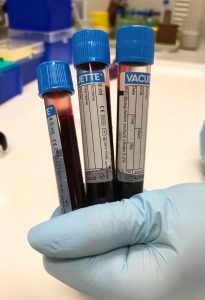Doctors often prescribe drugs to treat people who are at risk of heart attacks or strokes. But as every patient is slightly different, which drugs are likely to work best?

It’s an important question. Now researchers need your help – and a small sample of your blood – to help provide an answer.
Can you help us to investigate what factors influence platelet function?
We are a group of researchers from the Institute of Cardiovascular and Metabolic Research at the University of Reading and we are currently recruiting volunteers for a study (METPLAR) funded by the British Heart Foundation. This study is investigating how different levels of metabolic factors within the blood, such as hormones and fats, can affect platelet function.
Find out how you can volunteer…
Volunteers required for METPLAR Study
Understanding Metabolic Factors that Contribute to Platelet Reactivity (METPLAR)
Cardiovascular disease is the world’s leading cause of death. It effects almost every person either directly or through a close relative. Many of these deaths are caused by the formation of blood clots that can block blood vessels. If these blockages occur in the heart or brain they can cause heart attacks or strokes.
Platelets are the small blood cells that respond rapidly when we damage our blood vessels by sticking together and forming a blood clot. In normal circumstances these clots prevent bleeding but if an unwanted large clot forms that blocks the flow of blood it can cause a heart attack or a stroke.
Over recent years drugs that stop platelets sticking together (anti-platelet drugs) have proved quite successful in reducing the formation of blood clots and preventing heart attacks. Despite this success heart attacks are still one of the biggest causes of death in the UK.
Understanding how platelets function, why different people’s platelets react differently to blood vessel damage and to anti-platelet drugs, and what factors in the blood influence them is crucial for the development of new drugs that will prevent and treat heart attacks and stroke.
The study
 Every individual’s platelets respond slightly differently. The aim of the METPLAR study is to understand these differences. The study will determine which factors influence the speed at which platelets can respond to blood vessel damage, and what factors are likely to contribute to the formation of large clots.
Every individual’s platelets respond slightly differently. The aim of the METPLAR study is to understand these differences. The study will determine which factors influence the speed at which platelets can respond to blood vessel damage, and what factors are likely to contribute to the formation of large clots.
We will determine whether there is a relationship between an individual’s platelet reactivity and a number of metabolic parameters, including insulin sensitivity, and blood cholesterol.
With these measurements we hope to identify more accurate methods of testing platelets and determine which anti-platelet medications will work best with different individuals. This human study will be performed in collaboration with the Hugh Sinclair Unit of Human Nutrition at the University of Reading.
Looking for volunteers
We are currently looking for volunteers willing to take part in the study. The study consists of one short study visit (about 45 minutes) to the Hugh Sinclair Unit of Human Nutrition at the University of Reading, where your blood pressure, height, weight, waist and hip circumference and body fat composition will be measured and a blood sample will also be taken.
We are currently recruiting non-smoking men and women aged 30-65 years who are not diabetic or taking medications for cholesterol, triglycerides, blood pressure or inflammatory conditions.
You will be reimbursed travel expenses associated with the study.
CONTACT US
If you meet our criteria and are interested in participating in the study please contact the METPLAR study on 0118 378 7096 or email metplar@reading.ac.uk
